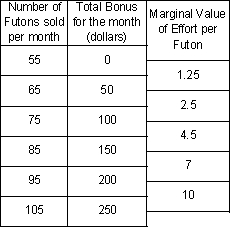Exam 10: Games, Information and Strategy
Exam 1: Introduction, Basic Principles, and Methodology43 Questions
Exam 2: Revenue of the Firm126 Questions
Exam 3: Topics in Demand Analysis and Estimation37 Questions
Exam 4: Economic Forecasting55 Questions
Exam 5: Production Analysis51 Questions
Exam 6: Cost of Production81 Questions
Exam 7: Profit Analysis of the Firm63 Questions
Exam 8: Perfect Competition and Monopoly67 Questions
Exam 9: Monopolistic Competition and Oligopoly75 Questions
Exam 10: Games, Information and Strategy58 Questions
Exam 11: Topics in Pricing and Profit Analysis70 Questions
Exam 12: Factor Markets59 Questions
Exam 13: Fundamentals of Project Evaluation72 Questions
Exam 14: Risk in Project Analysis57 Questions
Exam 15: Economics of Public Sector Decisions51 Questions
Exam 16: Legal and Regulatory Environment of the Firm36 Questions
Select questions type
Tacit collusion is collusion without a formal agreement or illegal communications among firms.
(True/False)
4.7/5  (37)
(37)
Adverse selection is a self-sorting process that occurs when the information characteristics of a transaction are such that undesirable products, services or customers are attracted to it.
(True/False)
4.8/5  (39)
(39)
A one-shot game is a game wherein each player has complete knowledge of what their rivals will do and has only one opportunity to pursue their chosen strategy prior to the game's end.
(True/False)
4.7/5  (40)
(40)
The following table is for two towel companies. They each offer cotton towels that are highly absorbent and fluffy even though they are made from different cottons. Since every household uses towels, these firms believe that there will always be a tomorrow for their product. Both Tom and Cathy have agreed to charge high prices in order to make a more than normal profit. For both firms, defecting from their agreement is a better choice than collusion.

(True/False)
4.8/5  (31)
(31)
A credible threat is the threat of an action that a rival actually has the ability to carry out.
(True/False)
4.9/5  (37)
(37)
A first mover advantage in a sequential game is a beneficial outcome that accrues to the player who exercises the first strategic choice.
(True/False)
4.9/5  (42)
(42)
The following table is for two towel companies. They each offer cotton towels that are highly absorbent and fluffy even though they are made from different cottons. Since every household uses towels, these firms believe that there will always be a tomorrow for their product. Both Tom and Cathy have agreed to charge high prices in order to make a more than normal profit. Neither firm will charge a lower price as there is a credible threat of punishment from the other.

(True/False)
4.9/5  (38)
(38)
A strategy that is best for a given player no matter the choice exercised by that player's rivals) is:
(Multiple Choice)
4.8/5  (39)
(39)
Given the following table, Nancy's Nook has a dominant strategy.

(True/False)
4.9/5  (32)
(32)
Asymmetric information is when both parties to a transaction have equal information and that information is free.
(True/False)
4.7/5  (37)
(37)
Costs associated with making certain the terms of an agreement are complied with are called incentive costs.
(True/False)
4.8/5  (37)
(37)
A strategy that will be rejected by a given player no matter the choice exercised by that player's rivals is:
(Multiple Choice)
4.8/5  (33)
(33)
Rationally, one would only continue to search until one perceives that the marginal cost of additional searching exceeds its marginal benefit.
(True/False)
4.7/5  (41)
(41)
Given the following table, Nash Equilibrium occurs in the lower right hand cell.

(True/False)
4.7/5  (50)
(50)
Frank's Futons currently sells 55 futons a month at $450.00 for a total of $24,750 each month. Frank wants to increase the sales volume and has decided to offer incentives. An employee will have the following bonus schedule and has also placed a monetary value on their marginal effort. This employee will sell 95 futons for a bonus of $250.00 dollars.

(True/False)
4.9/5  (40)
(40)
If you buy a priceless piece of artwork at an auction for mere dollars because you are the only one who recognizes the artist, you have used private information to your advantage.
(True/False)
4.8/5  (31)
(31)
Costs associated with making certain the terms of an agreement are complied with are called monitoring costs.
(True/False)
4.9/5  (31)
(31)
Showing 41 - 58 of 58
Filters
- Essay(0)
- Multiple Choice(0)
- Short Answer(0)
- True False(0)
- Matching(0)